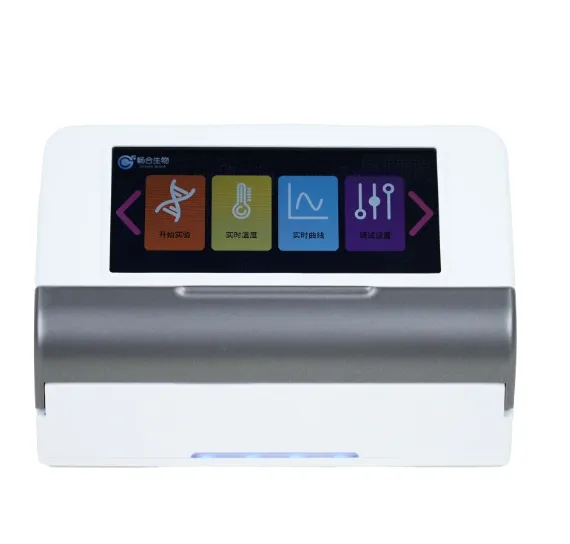
Revolutionizing Microbial Diagnostics with PCR
PCR for microbial identification has become a game-changer in the world of diagnostics, offering unparalleled speed and accuracy in detecting microbial pathogens. By amplifying specific DNA sequences, PCR for microbial identification can precisely identify bacteria, viruses, fungi, and parasites, even in minute quantities. This capability makes PCR an invaluable tool for both clinical and research laboratories, as it allows for early detection and targeted treatment of infections. Unlike traditional microbial identification methods, which can be time-consuming and labor-intensive, PCR for microbial identification enables rapid results that are crucial for effective disease management. The ability to accurately identify pathogens is fundamental to improving patient outcomes, especially in environments where infections need to be diagnosed swiftly to prevent outbreaks.

PCR for Identification of Bacteria: Enhancing Accuracy in Pathogen Detection
PCR for identification of bacteria plays a pivotal role in the rapid and precise detection of bacterial pathogens that cause diseases in humans, animals, and plants. With traditional bacterial culture methods taking hours or even days, PCR for identification of bacteria allows for near-instantaneous results by amplifying bacterial DNA from clinical or environmental samples. Whether it's for identifying foodborne pathogens, environmental contamination, or detecting infections like tuberculosis or pneumonia, PCR for identification of bacteria ensures healthcare providers and researchers can get to the root of the problem quickly. PCR's specificity and sensitivity offer a level of precision that traditional culture methods cannot match, providing accurate bacterial identification in a fraction of the time. This technology is essential for combating antibiotic resistance and preventing the spread of harmful bacterial infections.
Insulated Isothermal PCR: Simplifying PCR Testing with Innovative Technology
Insulated isothermal PCR represents a revolutionary advancement in PCR technology, allowing for amplification of DNA at a constant temperature without the need for thermal cycling. Unlike traditional PCR, which requires a PCR machine to alternately heat and cool samples, insulated isothermal PCR uses a stable, single temperature to achieve DNA amplification. This innovation simplifies PCR testing by eliminating the need for complex equipment and reducing the time and energy required for amplification. Insulated isothermal PCR has proven particularly valuable for point-of-care diagnostics, where portability and speed are essential. Its ability to produce reliable results quickly makes it an ideal choice for areas where access to laboratory infrastructure is limited, such as remote regions or during fieldwork. The simplicity and efficiency of insulated isothermal PCR are reshaping the landscape of molecular diagnostics.
Detection of PCR Products: Ensuring Accuracy and Reliability
The detection of PCR products is a critical step in confirming the success of the PCR process and identifying the presence of the target DNA. Following amplification, PCR products need to be detected to verify that the correct DNA has been amplified. There are several methods for the detection of PCR products, including gel electrophoresis, fluorescence-based assays, and real-time PCR, each offering different advantages depending on the application. The detection of PCR products is essential not only for confirming the presence of specific pathogens but also for quantifying the amount of target DNA in a sample. This is particularly important in viral load monitoring, cancer diagnostics, and environmental monitoring. The ability to reliably detect PCR products ensures that diagnostic results are accurate, reproducible, and useful in guiding treatment decisions.
PCR for Bacterial Identification: The Gold Standard in Microbial Diagnostics
PCR for bacterial identification has become the gold standard in identifying bacterial pathogens, offering a level of accuracy and speed unmatched by traditional diagnostic methods. Whether in a clinical or environmental setting, PCR for bacterial identification is used to detect a broad range of bacterial infections, from common pathogens like Staphylococcus aureus and Escherichia coli to rare or difficult-to-culture bacteria. By targeting specific genetic markers unique to bacterial species, PCR for bacterial identification enables rapid, precise detection and differentiation between closely related bacteria. This is particularly crucial in detecting antibiotic-resistant bacteria, where early identification can significantly impact treatment choices and infection control measures. The ongoing development of PCR-based assays for bacterial identification continues to expand its application in diagnostics, ensuring that healthcare providers can stay ahead of emerging bacterial threats.
PCR technology has transformed the field of microbial diagnostics, with innovations such as PCR for microbial identification, PCR for identification of bacteria, and insulated isothermal PCR leading the way in rapid, accurate pathogen detection. The detection of PCR products and the ability to identify bacterial infections with precision have revolutionized diagnostics, particularly in clinical and research settings. As PCR continues to evolve, its role in the fight against infectious diseases and its applications in environmental monitoring and genetic research are bound to grow, shaping the future of molecular diagnostics for years to come.
-
The Integration of Bio Detection with Artificial IntelligenceNewsMay.23,2025
-
The Importance of Calibration for Bioaerosol SamplersNewsMay.23,2025
-
The Importance of Bio Sampling in Environmental ResearchNewsMay.23,2025
-
The Advantages of Mini PCR TechnologyNewsMay.23,2025
-
How to Perform a Mycoplasma PCR TestNewsMay.23,2025
-
Choosing the Right Bacteria Detection Device for Your NeedsNewsMay.23,2025





